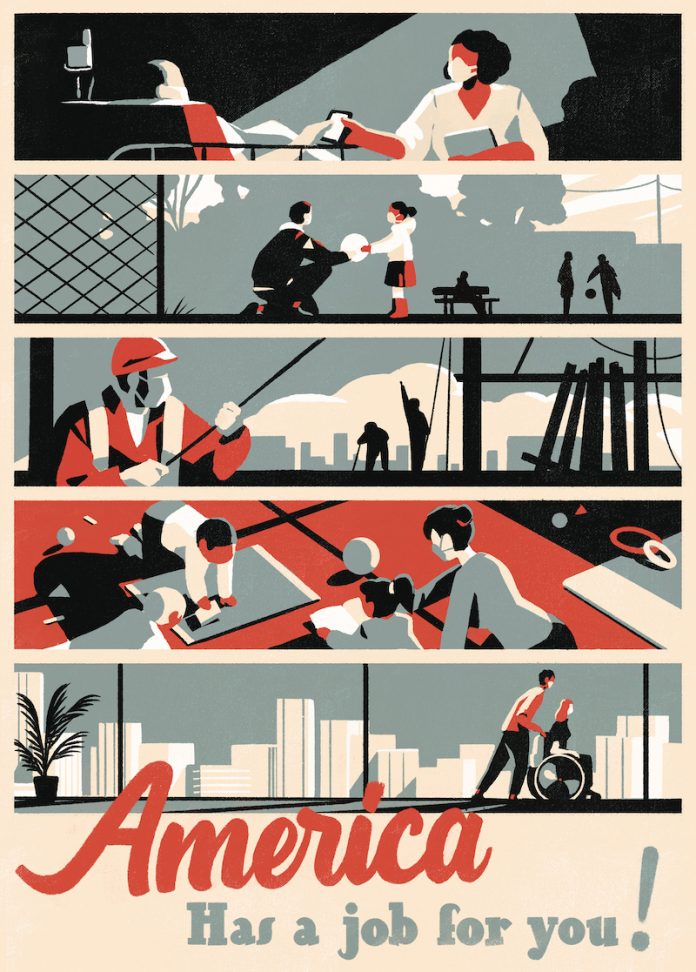By Eduardo Porter, of The New York Times
What should the president do about jobs?
For 30 years, Democratic administrations have approached the question by focusing on the overall economy and trusting that a vibrant labor market would follow. But there is a growing feeling among Democrats—along with many mainstream economists—that the market alone cannot give workers a square deal.
So after a health crisis that has destroyed millions of jobs, a summer of urban protest that drew attention to the deprivation of Black communities, and another presidential election that exposed deep economic and social divides, some policymakers are reconsidering a policy tool not deployed since the Great Depression: to have the federal government provide jobs directly to anyone who wants one.
On the surface, the politics seem as stuck as ever. Sen. Cory Booker, D-N.J., introduced bills in 2018 and 2019 to set up pilot programs in 15 cities and regions that would offer training and a guaranteed job to all who sought one, at federal expense. Both efforts failed.
And after progressive Democrats in Congress proposed a federal jobs program as part of their Green New Deal in 2019, Rep. Liz Cheney of Wyoming, the No. 3 House Republican, asked, “Are you willing to give the government and some faceless bureaucrats who sit in Washington, D.C., the authority to make those choices for your life?”
But when it comes to government intervention in the economy, the political parameters have shifted. A system that balked at passing a $1 trillion stimulus after the financial crisis of 2008 had no problem passing a $2.2 trillion rescue last March, and $900 billion more in December. President Joe Biden is pushing to supplement that with a $1.9 trillion package.
“The bounds of policy discourse widened quite a bit as a consequence of the pandemic,” said Michael R. Strain, an economist at the American Enterprise Institute, a conservative think tank.
On the left, there is a sense of opportunity to experiment with the unorthodox. “A job guarantee per se may not be necessary or politically feasible,” said Lawrence Katz, a Harvard professor who was the Labor Department’s chief economist in the Clinton administration. “But I would love to see more experimentation.”
And Americans seem willing to consider the idea. In November, the Carnegie Corp. commissioned a Gallup survey on attitudes about government intervention to provide work opportunities to people who lost their jobs during the Covid-19 pandemic. It found that 93 percent of respondents thought this was a good idea, including 87 percent of Republicans.
Even when the pollsters put a hypothetical price tag on the effort—$200 billion or more—almost 9 out of 10 respondents said the benefits outweighed the cost. And hefty majorities—of Democrats and Republicans—also preferred government jobs to more generous unemployment benefits.
The question is, would the Biden administration embrace a policy not deployed since the New Deal?
“We tried to set the bar at a federal job guarantee,” said Darrick Hamilton, an economics professor at the New School for Social Research. He was among advisers to Sen. Bernie Sanders who worked with Biden’s representatives before the November election to devise an economic strategy the Democratic Party could unite behind. “It was the cornerstone of what we brought in.”
On paper, at least, a job guarantee would drastically moderate recessions, as the government mopped up workers displaced by an economic downturn. But unlike President Franklin D. Roosevelt’s programs to provide jobs to millions displaced by the Great Depression, the idea now is not just to address joblessness, but to improve jobs even in good times.
If the federal government offered jobs at $15 an hour plus health insurance, it would force private employers who wanted to hang on to their workforce to pay at least as much. A federal job guarantee “sets minimum standards for work,” Hamilton said.
The president does not seem ready to go all the way. “We suspected we weren’t going to get there,” Hamilton said.
Biden’s recovery plan includes efforts to train a cohort of new public health workers, and to fund the hiring of 100,000 full-time workers by public health departments. His commitment to expand access to child care and elder care comes paired with a promise to create good, well-paid jobs in caregiving occupations. And he has pledged — in ways not yet translated into programs — to foster the creation of 10 million quality jobs in clean energy.
“There are a number of proposals to pair programs for people to be at work with the needs of the nation,” said Heather Boushey, a member of Biden’s Council of Economic Advisers.
And yet the idea of a broad job guarantee is still an innovation too far. For starters, it would be expensive.
Hamilton, who favors a federal job guarantee, was co-author of a 2018 study—with Mark Paul, William A. Darity Jr. and Khaing Zaw—that sought to estimate the cost. Based on 2016 employment figures, and assuming an average cost per job of $55,820, including benefits, the study found it would cost $654 billion to $2.1 trillion a year, which would be offset to some extent by higher economic output and tax revenue, and savings on other assistance programs like food stamps and unemployment insurance.
And the prospect of a large-scale government intervention in the labor market raises thorny questions.
First, there’s determining the work the government could offer to fulfill a job guarantee. Health care and infrastructure projects require workers with particular skills, as do high-quality elder care and child care. Jobs, say, in park maintenance or as teaching aides could encroach on what local governments already do.
What’s more, the availability of federal jobs would drastically change the labor equation for low-wage employers like McDonald’s or Walmart. Strain argues that a universal federal guarantee of a job that paid $15 an hour plus health benefits would “destroy the labor market.”
Some wealthy countries have job guarantees for young adults. Since 2013, the European Union has had a program to ensure that everyone under 25 gets training or a job. But those programs are built on subsidizing private employment, not offering government jobs.
A 2017 overview of research on the effectiveness of labor market policies—by David Card of the University of California, Berkeley; Jochen Kluve of Humboldt University in Berlin; and Andrea Weber at Vienna University—concluded that programs that improve workers’ skills do best, while “public-sector employment subsidies tend to have small or even negative average impacts” for workers. For one, private employers seem not to value the experience workers gain on the government’s payroll.
Another economist, David Neumark of the University of California, Irvine, is skeptical that new policies are needed to ensure a decent living for workers. Programs like the earned-income tax credit, which supplements the earnings of low-wage workers, just need to be made more generous, he said.
“I’m not sure we are missing the tools,” he said. “Rather, we have been too stingy with the tools we have.”
Neumark notes that the idea of government intervention to help working Americans is gaining traction even on the political right. “Republicans are at least talking more about the fact that they need to deliver some goods for low-income people,” he said. “Maybe there is space to agree on some stuff.”
While opposed to a broad guarantee, Strain of the American Enterprise Institute sees room for new efforts. “If the question is ‘Do we need more aggressive labor market policies to increase opportunities for people?’ the answer is yes,” he said. “I think of it more as a moral imperative than from an economic perspective.”













